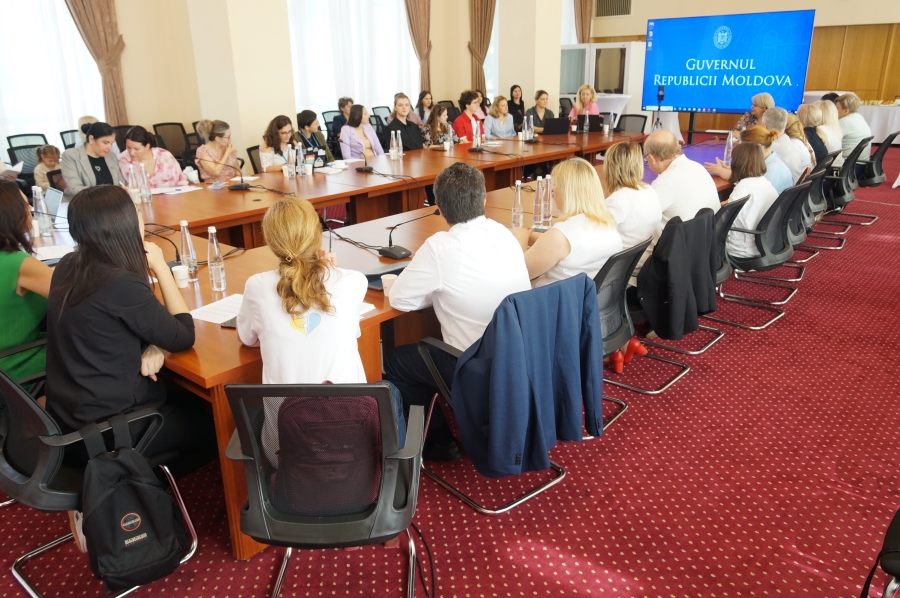
Facilitated access to higher education in Moldova for young refugees from Ukraine
The facilitation of access for young refugees from Ukraine to higher education in Moldova today was discussed at a meeting organized by the Ministry of Education and Research (MEC).
The discussions were attended by both young refugees and representatives of higher education institutions, the General Inspectorate for Migration under the Interior Ministry (MAI), as well as partner organizations: Female Support Force, the National Congress of Ukrainians of Moldova, Office of the United Nations High Commissioner for Refugees (UNHCR), United Nations Children’s Fu8nd (UNICE), and People in Need.
The youth had the opportunity to learn firsthand about the educational offers of the institutions and ask questions regarding enrollment. Thus, the participants in the meeting analyzed aspects related to the admission process, including the conditions and documents required for enrollment, the procedure for diploma equivalence, facilities granted to refugees, and the study conditions offered by universities.
Participants also discussed a recently adopted measure that allows young refugees from Ukraine, admitted to fee-based studies, to pay the same tuition fee as citizens of Moldova—a decision meant to support equitable access to higher education.
Ivan Duminica, head of the Service for Policies in the Field of Interethnic Relations at MEC, said that facilitating access to higher education for young refugees was not only an act of solidarity, but also a firm commitment of Moldova to promote social inclusion through education.
"We are pleased with the increased interest of refugees, as well as the openness shown by higher education institutions of the country," said Ivan Duminica.
In the 2024-2025 academic year, 211 young people from Ukraine—or enrolled as foreign students—are studying at universities of Moldova at bachelor's and master's levels, reports the Ministry of Education and Research. They have opted for fields with high demand on the labor market, such as foreign languages, business and administration, accounting and finance, humanities, psychology, pedagogy and medicine.
Model schools' network expands in Moldova, to include 90 institutions, with investments of 220 million euros
DOC // Moldovans working in Switzerland to be able to receive pensions, social guarantees
Spokesman for government describes concert held nearby exhibition dedicated to deportation victims as insult to Moldova's collective memory
VIDEO // Codrii Nature Reserve promoted through new video spot by EcoContact association of Moldova
Over 375,000 people from Transnistrian region have Moldovan citizenship
Regulations on updated tariffs for forest damages published in Moldova's Official Journal
Approved by government: Chisinau International Airport to be named after renowned departed composer Eugen Doga
Admission to Moldova's higher education institutions starts on July 21; platform for online submission of applications improved
Moldovan Justice Ministry says Lawyers' Union revised decision obliging lawyers not to provide any legal assistance during strike
Over 1,400 children of Moldova participate in European Excursion educational programme, second edition
Nicolae Testemitanu Medical University of Moldova starts admission for bachelor, integrated, master's studies for native citizens
Moldovan MP says parliament voted laws to stabilize economy against external shocks
Moldova, Sweden to strengthen bilateral cooperation
Moldovan parliament speaker attends opening of Alexandru Mosanu lecture room at State University of Moldova
Politicians of Moldova's Dignity and Truth Platform join team of Action and Solidarity Party for parliamentary elections
Romania reaffirms support for Moldova on all fronts
Moldovan president tells Austrian daily: if Russia takes power in Moldova, country to become base for hybrid warfare against EU
United Nations Children's Fund donates 140 laptops to strengthen primary healthcare in Moldova
INTERVIEW MOLDPRES // Moldovan parliament speaker says mandate full of challenges; leadership had to deliver more than promised
Italy third most important trading partner of Moldova in EU
Moldova first Eastern Partnership country to approve national smart specialization programme
Judicial experts from Moldova, Ukraine, Romania assemble in Chisinau to discuss strengthening judicial independence, accountability in current regional context
Documentary film on deportations from Moldova to be screened on parliament's square
Moldovan president to pay working visit to United Kingdom; Moldovans settled in UK invited to discussions
Application promoting sustainable tourism launched in Moldova


